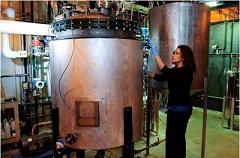I’m writing this review as I fly on a plane and I’m feeling guilty about the amount of CO2 that is emitted when flying – on average, flying contributes about 10 times as much carbon dioxide to the atmosphere as a similar journey by train. And no, I didn’t buy carbon offsets for this trip….
 The guilt is being fostered by this week’s read, a Green Series, published by Chelsea Green Publishing. I read four in the series, all co-written by Jon Clift and Amanda Cuthbert: Energy; Water; Greening Your Office; and Climate Change. Also in the series: Reduce Reuse Recycle; Composting; and Biking to Work.
The guilt is being fostered by this week’s read, a Green Series, published by Chelsea Green Publishing. I read four in the series, all co-written by Jon Clift and Amanda Cuthbert: Energy; Water; Greening Your Office; and Climate Change. Also in the series: Reduce Reuse Recycle; Composting; and Biking to Work.
I liked how easy the series is to read, many bullets points and quick facts, as well as their, “If you do one thing” pointers and the way they have the, “spend nothing save less,” and spend little, save more.” On the negative side, the books don’t have any real background on the issues, but the authors do have a list of resources at the end of each book.
I’m going to leave you with this thought, since many who are pushing environmental responsibility often go to far as they live further and further off the grid. (Let’s get a grip. It is not in our country’s best interest to revert back to the pioneer days).
“We can take control of the situation and reduce our energy and reduce our consumption. We don’t have to live shivering in an unheated room with no modern appliances; we’re just talking about being more energy efficient – reducing the need for so much power.”
To read these books or any I review, click here, and if you have a book you’d like me to review, email me at jomschro2071@gmail.com.


 Corn growers heard from
Corn growers heard from  Chicago-based Zenergy International has bought the Greenlight Biofuels biodiesel plant near Lubbock, Texas.
Chicago-based Zenergy International has bought the Greenlight Biofuels biodiesel plant near Lubbock, Texas. Catilin is commercializing the research done in developing the new catalyst at Iowa State University in Ames and the U.S. DOE’s Ames Laboratory. The T300 heterogeneous catalyst is nontoxic and can be a direct replacement for conventional catalysts used in biodiesel production. The drop-in solid catalyst operates at industry standard pressures and temperatures and is removed with filtration. As a result, current producers can retrofit their plants in a matter of days at very low cost. Another key advantage is that the glycerin coproduct has purity greater than 98 percent and qualifies as technical grade, which significantly enhances its overall value.
Catilin is commercializing the research done in developing the new catalyst at Iowa State University in Ames and the U.S. DOE’s Ames Laboratory. The T300 heterogeneous catalyst is nontoxic and can be a direct replacement for conventional catalysts used in biodiesel production. The drop-in solid catalyst operates at industry standard pressures and temperatures and is removed with filtration. As a result, current producers can retrofit their plants in a matter of days at very low cost. Another key advantage is that the glycerin coproduct has purity greater than 98 percent and qualifies as technical grade, which significantly enhances its overall value. One of the stars on hand to address the crowd at
One of the stars on hand to address the crowd at  “It’s what we do. We sell blenders to everyone,” said Scott Negley, director of alternative energy products at
“It’s what we do. We sell blenders to everyone,” said Scott Negley, director of alternative energy products at  The cars are the result of the work Roush has been doing with propane in gasoline
The cars are the result of the work Roush has been doing with propane in gasoline  POET CEO Jeff Broin, seen here being interviewed in the field this morning, is glad for sunshine. At last year’s Project LIBERTY Field Day we had a wet one.
POET CEO Jeff Broin, seen here being interviewed in the field this morning, is glad for sunshine. At last year’s Project LIBERTY Field Day we had a wet one. 
 An Iowa State University researcher has been named “Innovator of the Year” for his work on biofuels.
An Iowa State University researcher has been named “Innovator of the Year” for his work on biofuels.